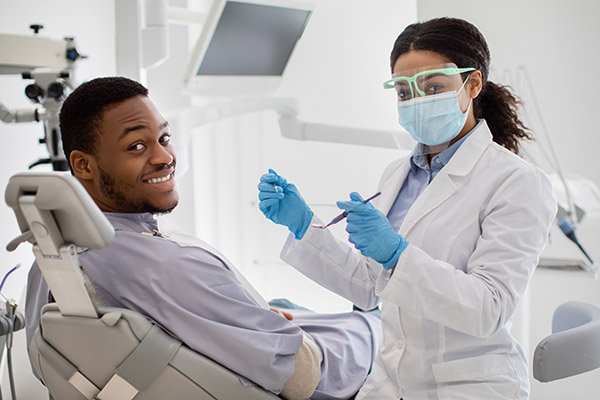3 Reasons Adjusting to New Dentures Can Be Quite Simple

When you begin wearing dentures, you may experience discomfort for a short period while you are adjusting. However, this process does not have to be complicated. There are many ways to make the adjustment more manageable and more enjoyable.
Why adjusting to new dentures is simple
Here are three reasons you can easily get through the first few weeks of wearing dentures.
1. Assistance is only a phone call away
If you find adjusting to new dentures difficult, remember that you can always call or see your dentist if you experience issues for longer than expected. Adhere carefully to the oral hygiene guidance provided at your dental checkups, and schedule a visit with your dentist if you feel you need your dentures adjusted for a better fit.
When you pick the new false teeth up from your dentist, be proactive and ask for a few tips on getting through any initial trouble. Then, attend any follow-up appointments scheduled in addition to your regular dental checkups.
2. A little patience can go a long way
As you embark upon having dentures prepared for your mouth, understand that getting used to the feeling of wearing dentures will take time. Speaking and eating are more difficult while adjusting to new dentures and may initially seem a little embarrassing. However, remember that wearing false teeth will become second nature with time and patience.
Minor soreness is normal in dental patients with new dentures. More severe irritation may warrant a trip back to the dentist for an adjustment. Removing dentures every few hours during the assimilation phase can help with any pain, so try wearing them for only short periods as you get used to them. Additionally, the American Dental Association recommends taking small bites of soft foods for those adjusting to new dentures. Once you are comfortable with softer foods, you can slowly incorporate more challenging to chew provisions into your diet. You may want to eat most of your meals at home while you acclimate to eating with dentures.
3. There are various products available to help
Not all dental adhesives are created equally. Since every person is different, dental adhesives that work for one patient may not work well for another. When you retrieve your dentures from the dentist, request recommendations for several creams or adhesives to try while adjusting to your new dentures. If one serum does not help you with your false teeth after a few applications, try another one of the suggestions made by the dental office. After trying several and giving yourself some time to acclimate to the functionality of dentures, call your dentist if you still feel uncomfortable. Chronic discomfort could mean that your dentures need to be refitted by a dental professional.
Tips for new denture wearers
As you adjust to your newly improved smile, there are some important steps you should take to keep your mouth more comfortable while protecting your new dentures. Even as the initial discomfort wears off, it may still be necessary to adjust your diet to accommodate these dental appliances. Avoid biting directly into hard, crunchy, or sticky foods, such as:
- Raw carrots, apples, and corn on the cob
- Certain chips or crackers
- Hard or sticky candies
- Nuts
- Tough, crusty bread
Healthy produce can be cooked or diced into bite-size pieces instead. Other options should be limited or avoided altogether. Seeds and popcorn can also be problematic because tiny particles can become lodged between dentures and the gum line, leading to irritation and poor fit. Avoid these as well.
Dentures should be cleaned properly on a daily basis using tools and products that are specifically designed for these types of appliances. Hard toothbrushes and traditional toothpaste can corrode the materials over time. When they are not being worn, dentures should be properly stored according to your dentist's instructions to prevent them from becoming dry and brittle. Otherwise, they are more likely to break or become damaged.
When removing dentures, take care to cushion any nearby hard surfaces with a towel. If the appliances are accidentally dropped, they are less likely to crack, chip, or break on impact.
Conclusion
Remember, your new dentures are meant to improve your quality of life by enabling you to speak and chew comfortably. Any discomfort you experience initially can be overcome with a little patience, experimentation, and a trip back to the dentist if all else fails.
Request an appointment here: https://smilewellsouthbay.com or call SmileWell Family Dentistry at (310) 904-6375 for an appointment in our Torrance office.
Check out what others are saying about our dental services on Yelp: Dentures and Partial Dentures in Torrance, CA.
Recent Posts
For some people, the idea of getting dentures can be a scary prospect. If you are in this situation, it may mean that you have lost most or all of your teeth. This could have happened because they were severely decayed or many of them were damaged in a serious accident. Regardless of why you…
For centuries, people have used dentures to replace missing teeth. The fact that they are still in use today speaks to how practical and effective they can be. Dentures are a popular option for those who are missing multiple teeth and do not have the desire or the ability to undergo extensive dental work. Developments…
As teeth get older, you may have to consider replacing them with dentures or partial dentures. This can lead to a lot of questions, especially if a person has never owned dentures previously. It is important to understand the current condition of one’s teeth in order to determine the right denture fit. Teeth naturally wear…
According to the American Dental Association, a denture should fit securely without adhesive. However, some patients find that a traditional denture slips and moves around. Implant-supported overdentures snap onto dental implants to create a more stable fit. Patients may not be familiar with these types of prostheses, as they are less common than regular dentures,…


